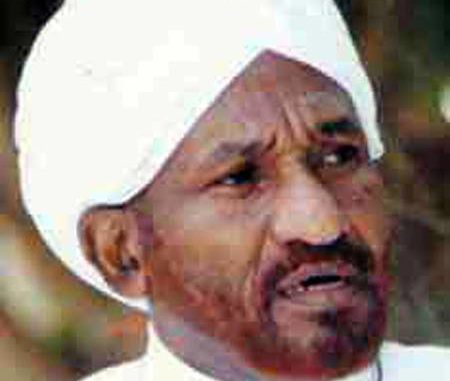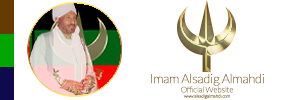
Press Statement
Foreign press association
Cairo 26/2/2001
Good Evening
I welcome your meeting in the auspices of the……
Of Foreign Correspondents in Cairo . You have offered us a channel to address Egyptian, Arabic, African, and indeed International opinion.
I shall introduce four points of special importance and shall be ready for your questions and comments afterwards.
The First Point: Since our return to the Sudan we have engaged in four main activities.
- Party political and organizational activity. Consequently we now have a cohesive political machine, with a specific strategy, and consensus in support of its leadership.
This transitional organization will lead the party until the coming General Conference. The General Conference will meet after regional and specialized conferences concerning youth and students, women, and trade unions.
A number of workshops addressing the country’s major problems will also precede the General Conference. The workshops will prepare the studies and recommendations for the party program.
- We have mobilized popular support for the National Agenda and its main constituents: Just Peace, and Democratic Transformation. This Agenda with all its specific items has dominated the country’s political scene in the popular and press aspects.
- We have initiated dialogues with other opposition parties to address the difference which prevailed since the last Musawa conference ( from 9/9 to 15/9/2001 )
In this respect we have held dialogue with the D.U.P with the SPLM/A, and other internal opposition parties, e.g., The Front for the Restoration of Democracy and others. These dialogues aim at establishing common ground towards a comprehensive Political Resolution of Sudan’s conflicts. They will continue until the aim is achieved.
- Since we signed the National Calling on 26/11/1999, we have continued to negotiate with the Regime. The results of these negotiations have been presented to the Umma Party’s leadership councils to study and decide.
After deliberation, the leadership councils of Umma resolved:
That we shall complete and sign an Agreement with the ruling party upon a National Program including the constitutional alternative, the principles for a Just Peace, and all the basic National issues.
This National Program will constitute a second step after the Djibouti Agreement.
- That we should cooperate with Regime on basic National issues Through agreed National mechanisms, for example,
- A supreme National Peace council.
- A National commission for constitutional Reform. Plus other National issues.
- To accept the principle of participation after agreement upon the National Program, and after the timing and mechanisms of implementation have been decided.
Participation will be on one of two alternatives:
The first: On the basis of free and fair elections at the different levels after agreement on the laws regulating them, and after their free and fair character have been assured Short of these levels, participation in state institutions would be in terms of the institutions of state whose National character has been established.
The second: Participation in the context of a National Government based on National consensus.
We believe that our activities have created a new political climate potentially capable of being developed to a new dawn of just peace and Democratic stability.
Many countries in the Arab world and Africa suffer from a zero sum
Confrontation between Regimes which allow no change, and opposition movements bent upon their overthrow.
The Sudanese Scenario could offer an alternative pushing the Regime towards change, and the opposition towards a positive response taking the country to just peace, and real Democracy.
The Second Point: These developments in Sudan have been accompanied by certain setbacks, eg.
- Improper General elections in which the regime, in the absence of real competitions, elected itself, have been held.
- The state of emergency has been prolonged for a year.
- Political arrests have taken place.
- Labour laws have been changed to deprive women of some of their labour rights.
These setbacks are not without some justifications however unacceptable they may be.
Thus the Regime needed to fill certain constitutional gaps in the absence of a legislative body. We have rejected these justifications and boycotted the elections.
In these circumstances, like minded Regimes would cover their elections with a thick blanket and describe events in their own terms. However, in Sudan we have freely observed all the electoral process and exposed its discrepancies and faults.
This transparency is itself part of the margin of freedom which prevails.
- The prolongation of the state of emergency is in the context of the bitter conflict which followed the schism within the ruling party, and the ensuring scenarios of confrontation. Nevertheless, we have opposed the prolongation and we expect the state of emergency to be lifted after the convening of the National Assembly.
- The arrest of the Secretariat of the N.D.A was mixed up with certain compromising circumstances, namely, they have held a collective meeting, In a clandestine venu , with a American official at a time when Miss Suzan Rice had, after visiting the territories administered by SPLA,M virtually declared was on the Sudan Government. Nevertheless, we have opposed the principle of arrest without trial, and called for a just, open, and prompt, trial of the arrestees.
- However, the arrest of Sayed, Ghazi Sulieman and Ali Mahmoud Hasanien was an unjustifiable abuse of Human rights. We have, among others campaigned for their release. They have been released.
- Changing labour laws to deprive women of some of their rights has been widely opposed including elements within the ruling party. I expect the law to be changed in favor of women’s labour rights.
Yes these are setbacks, but the difference now is that we are able to mount opposition against them inside the Sudan and to mobilize popular opposition to them. This proves the prevalence of a new political climate allowing the effective operation of an internal front for peace and Democracy.
The third point: The Memorandum of understanding between the popular National Conferences and the SPLM published in 19/2/2001 indicates a movement by the two extremes of Sudan’s political spectrum towards moderation. This is by itself commendable. The Memorandum agrees with the National Calling which we have signed with the Regime on 90% of the points, and it could contribute to the build up of a National Consensus for just peace and Democratic transformation. However, the Memorandum included agreement to form a front to confront the Regime and replace it.
The country does not need anther confrontational front. The situation is ready for serious negotiations for a comprehensive political Agreement. The peoples of Sudan suffer so much and could do with less preparation for conflict and more seriousness about mobilization for a comprehensive political agreement.
To be relevant to the National and International reality, the Memorandum should have called for an end to violence, and an extension of freedoms. It should have offered a comprehensive cease –fire to accompany serous direct negotiations.
This determination to open a new confrontational front opened the way for the recent security measures. However, we have declared our opposition in principle to arrests without trial.
We call for a just, prompt, and open trial for the arrestees. Their right to defend themselves should be guaranteed.
The Forth point: What is the propose of this visit to Cairo?
- To discuss with Egyptian officials the current developments in the Sudanese political situation, and to consult with them about the measures required to activate the joint imitative.
- To continue the dialogues with the Sudanese opposition parties.
- To address Egyptian, Arabic, African, And International opinion on Sudanese developments, recommending what should be done to build upon the positive developments, and to contain the negative ones.
ASADIG ALMAHDI

